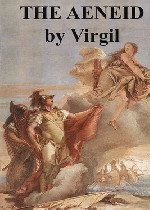
“The Aeneid” is considered by some to be one of the most important epic poems of all time. The story is as much one of the great epic hero, Aeneas, as it is of the foundation of the Roman Empire. Aeneas, a Trojan Prince who escapes after the fall of troy, travels to Italy to lay the foundations for what would become the great Roman Empire. Virgil’s “Aeneid” is a story of great adventure, war, love, and of the exploits of an epic hero. In the work Virgil makes his commentary on the state of Rome during the Rule of Augustus. It was a time that had been previously ravaged by civil wars and with the reign of Augustus order and peace had begun to be restored. That order had a price though. Many of the freedoms of the old Roman Republic had been lost under the new Imperialistic Rome. This loss of freedom and the debate over the virtues of a Roman Republic versus an Imperialistic Rome was central to Virgil’s time and is interwoven throughout the poetic narrative of “The Aeneid.” Virgil’s work forms the historical foundation for the argument of the empire over the republic as the best form of government. This edition is translated into English verse by John Dryden, includes an introduction by Harry Burton, and is printed on premium acid-free paper.

亦名《新俄国游记》。瞿秋白的著名散文集,写于1920年10月至1921年10月,1922年出版。当时作者以<晨报>记者身份赴苏,本书即为自哈尔滨至莫斯科的游记。它拨开了国内外反动派所散布的“重障”,真实地报道了十月革命胜利之后的苏俄现实。无产阶级革命所引起的深刻变化,俄国劳动者以主人公的姿态所进行的艰苦卓绝的斗争和创造性劳动,以及革命后的俄国的政治、经济、文化等,都在作品中得到了反映。苏俄的现实深深地触动了作者,促使他向共产主义战士的高度迈进,因而,这部游记是一个伟大的心灵为了探索真理与祖国的光明未来而经过的一段艰苦历程的实路录,有着巨大的思想意义和文学价值,是“五四”运动时期优秀散文之一。